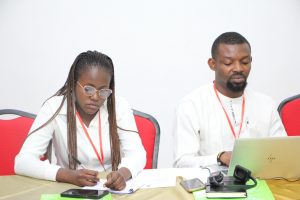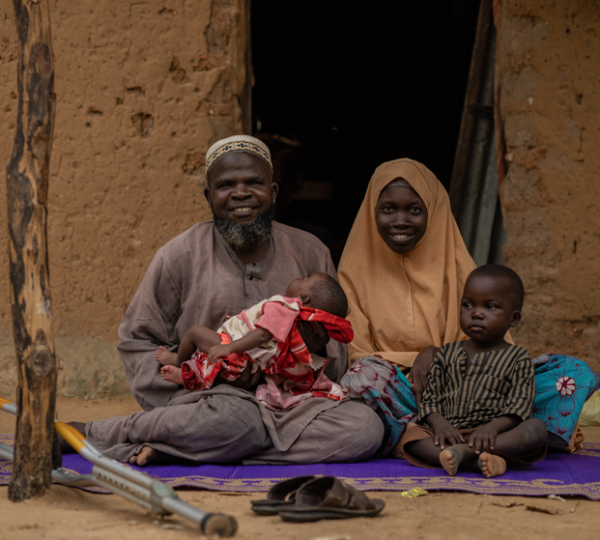Illuminating Insights from My 6-week Undergraduate Internship Journey at the Society for Family Health.
By Gondyi Ohnan
As a final-year student studying Public Health at Babcock University, one of my career goals was to work with the Society for Family Health. This was my second time applying for this role and I was filled with excitement when my application was accepted. SFH always stood out for me from other NGOs as an organisation that has been fully invested in improving healthcare systems in Nigeria from the community level for over 40 years. Embarking on this internship journey at the Society for Family Health (SFH) was not just a career move; it was an enlightening experience that allowed me to delve into the world of public health and gain hands-on experience in various aspects of programme management, data analysis, and report writing under the Lafiyan Yara Project. Beyond the technical skills I acquired, what truly made this internship exceptional was the peaceful and positive work environment that surrounded me throughout my tenure.
The Learning Curve:
Report Writing and Reviewing Reports
One of the fundamental skills I honed during my internship at SFH was report writing. Part of my responsibilities included crafting reports which documented the progress of various health programmes and initiatives such as meetings with Elizabeth Glaser Pediatric AIDS Foundation (EGPAF) and the Social Innovation In Health Initiative (SIHI Nigeria). These reports were not only a reflection of the organisation’s efforts but also a vital tool for decision-making. Writing reports not only improved my communication skills but also deepened my understanding of programme dynamics.

Furthermore, I was privileged to review reports crafted by seasoned professionals at SFH and outside the organisation. I participated in the review of the draft concept note by the Federal Ministry of Health (FMoH) which was used in developing an action plan for conducting Nigeria’s Health Management Information System (HMIS). I also joined the Programme Manager and Monitoring and Evaluation officer in the review of the Lafiyan Yara Phase II project. This process was incredibly insightful, as I was exposed to different writing styles, data presentation techniques, and the critical importance of accuracy in public health reporting. The meticulousness and attention to detail demonstrated by my supervisors were inspiring, and I strived to emulate their standards.
Navigating the World of Programme Management
Another insightful aspect of my internship was my involvement in programme management. I was allowed to work closely with the programme managers of the Lafiyan Yara and Global Fund National Aligned HIV&AIDS Initiative (GF NAHI) Projects. This hands-on experience allowed me to understand the intricacies of programme planning, execution, and evaluation. I participated in project meetings, contributed to strategic discussions, and witnessed firsthand the impact of well-coordinated programme management on public health outcomes.
Monitoring, Evaluation & Data Analysis
In the era of data-driven decision-making, my internship at SFH provided me with invaluable exposure to data analysis and monitoring & evaluation (M&E) processes. I was given access to extensive datasets and had the chance to apply statistical techniques to extract meaningful insights. Understanding the role of data in shaping health interventions was eye-opening, and it reinforced the importance of rigorous M&E in public health programs.
I was also opportune to be at the round table meeting with the Federal Ministry of Health (FMoH) and other Non-governmental Organisations in Abuja where we assessed Nigeria’s Health Management Information System (HMIS) to inform a road map for its improvement.
A Peaceful and Positive Work Environment
One of the standout aspects of my internship experience at SFH was the tranquil and encouraging work environment. The organisation’s commitment to employee well-being was evident in the support and mentorship provided to interns. Colleagues were not just coworkers but mentors who willingly shared their expertise and knowledge.
My profound gratitude goes to the management staff of SFH and to my supervisors, Mrs Aisha Dadi and Mr Simeon Christian Chukwu for their guidance while directly working under them, and many others who created a pleasant working environment for me. The positive atmosphere fostered creativity and collaboration, making it an ideal place for professional growth.
Conclusion
My internship at the Society for Family Health was a transformative journey that allowed me to acquire a diverse set of skills. It reaffirmed my passion for public health and left me with a deep appreciation for organisations that prioritise both professional growth and employee well-being. This internship will forever be a cherished chapter in my career journey.






